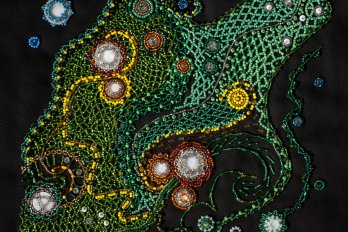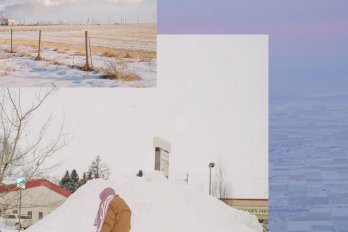Ten years ago, after my mother was diagnosed with dementia at age sixty-one, she was in free fall. She lived alone and had lost her job. In a state of desperation, she began a mnemonic project of her own design. She tried to memorize a list of 150 animal names.
I didn’t know where this idea came from. It seemed like her plan was to prove to the doctors that there was nothing wrong with her. She copied this list out over and over and over, filling notebooks, sketchbooks, the insides of novel and self-help-book jacket covers. Even after she entered an assisted-living facility, she continued to compulsively copy out this list of animals. I think it became a way to focus her fear into some kind of activity. I even found the names of animals scrawled across two of her pillowcases. I couldn’t help picturing these animals running through her dreams.
As I approached my mid-forties, I became terrified that what had happened to my mother would happen to me. My anxiety inspired a fierce determination to seek out as much information as I could. I wouldn’t bury my head in the sand, I promised myself. I spit into a mail-order DNA test tube and found out that I carry a copy of the APOE4 gene, which increases my risk of developing dementia. So I began to do what some of the current science—the consensus is constantly changing—recommends to decrease my risk. Every day, I take a heroic dose of concentrated turmeric and swallow spoonfuls of fish oil along with a host of other supplements. I bike to work. I meditate. I drink tea. I eat blueberries and greens and sweet potatoes.
I also started to police my own cognitive health. On my worst day, I was melting a quarter cup of coconut oil on the stove for a flourless, high-fibre seed loaf when my young son called me into the living room. He showed me something in his dinosaur book, and I totally spaced out about the oil heating on the burner. When I ran back into the kitchen, there was a column of flame rising about three feet out of the saucepan. I panicked. Wait, how do you put out a grease fire? I know, not water, not water. My son started screaming. It was a mess.
Later, I texted my husband, “I’m really worried about my brain,” and he texted back, “Dude, no offence, but you’ve been burning pots since I met you in 1998.”
Still, I made an appointment for a full cognitive-health evaluation. Toward the end of the exam, the doctor conducting the test asked me to list as many animal names as I could in two minutes. I smiled. I suddenly understood where my mother’s lists came from. I also saw that, in trying to face the spectre of this illness head on, I had lost myself in my own lists.
My mother no longer knows my name. She couldn’t explain who I am to anyone who might ask her, “Who is this, Joanna?” But we still find each other in a space beyond language. When I visit her at the nursing home where she lives, near Buffalo, I find a quiet corner for us, away from the other residents and the sound of the television. On my phone, I play old songs she used to sing to me when I was a child. Sometimes she knows the words to the chorus; sometimes she hums the melody. These are the moments I feel closest to her. No matter how anxious I am as I drive from Toronto to see her, no matter how guilty I feel over how long it’s been since my last visit, when we are sitting together like that, singing, I am filled with gentleness and patience, and I’m completely present. In this way, she’s teaching me to treat myself with the same kindness.
Sometimes the ghost of an old fear will bubble up inside my mother. And we ride through it like a wave. Her body stiffens, her face clouds, she might mutter something about a bill. I hold her hand, I speak in a calm voice. It passes. We turn our attention back to the music. A line will suddenly leap forward—maybe James Taylor singing “I always thought I’d see you again”—and our eyes will well up as we sing it together.





